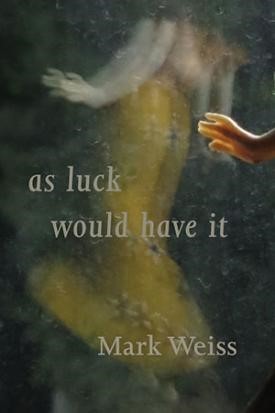Mark Weiss: 'Different Stories' from 'As Luck Would Have It'

[The following is from Mark Weiss’s long awaited & very welcome new book, As Luck Would Have It, from Shearsman Books in the UK. Comments by Ron Silliman & Peter Manson appear beneath the poems – a further tribute to Weiss’s presence & prowess in a new American poetry & poetics.]
DIFFERENT STORIES
1
The man who lives in boring times
bucket by bucket moves a mountain.
Wedded to the trajectory,
a collection of shattered lenses,
a matrix of rituals.
Man, or machete.
A catalogue of expectations.
Cutlass, for instance,
the brute violence of the toolshed
become a scimitar in the hands of pirates.
2
On the subway platform the girl sways
to invisible music.
Maybe she’s gone to the islands.
Different stories.
I knew a girl whose childhood
was her mother’s experiment
in elective surgeries to make her
“beautiful,” new nose, new eyelids,
as the world sees it.
Except that she’d refused the last experiment.
A different story. And what became
of all that perfection,
that one defiance,
that vote for symmetry.
3
Failure to make circles.
Old age, as the young man assured me,
is a state of mind.
In the order of things
there will be fire.
Ownership of islands will be swept by the sound
and all these wetlands.
This has been home
and this has been home
and this has been home.
Much of what you plan for
won’t happen, and what does
you’ll be unprepared for.
Following beasts,
elk and elephant providing wisdom.
“Where grass is good
there will be meat.”
“Salt is aggressive
and rises to water.”
4
Mist
and mystery
in the English
idiom, math
and mastery
in the physics of war.
5
A nice day,
flaxen girl in flat sandals licks
a cone of white ice cream
and strides through the park.
Strides through the park in flat sandals
licking a cone of white ice cream.
So nice a day. She eats
white ice cream.
Oh custard.
Oh sugarplum.
6
A Mayan woman with her Mayan children
at the Delacort fountain.
Hard to imagine a beauty more divorced
from that belle époque fragility, she
recalling blood and viscera.
But her children
will speak the local dialect.
7
A tendency to swallow whole when excited
(a tendency to excitement)
but masticate, grind,
that the chestnut not
become the death of you. Chew
as if your life
depended on it.
Time enough for the visible world
beyond the restaurant.
8
In his will he endowed a fund
to feed a homeless person once a year
the finest, most expensive,
and record
the recipient’s despair
thereafter.
9
Gleaning the last of an insufficient harvest, he
chops down the final bit of scrub so that his child
will have warm food. Who knows
what luck might bring
to keep them for another day.
First worry,
then despair.
Maybe the last
of insect or mammal
will descend upon them.
Where blond means enough to eat
and brunette not so much.
10
So it turns out
that we’re not the answer
to the dreams of centuries.
Lope of the hunter from field to forest.
“We have adapted wheat to grow on clouds
and grain to fall like rain.”
Laughed, then died, and the living
guess at the joke.
* * *
SOME COMMENTS ON MARK WEISS AND AS LUCK WOULD HAVE IT
“This is a barefoot poetry, almost in the very oldest Asian sense of that phrase, a poetry of voice & body that recognizes that even body-language has accents, which surely it does. The eye is keen, the humor self-deprecating. Mark Weiss has reached that point on life’s mesa where forgiveness (to oneself as well as others) may well be the most important of gestures. A book to make you glad to be in the world.”
—Ron Silliman
“From point and line to jetplane, ‘The line articulated / so as to express volume’. In As Luck Would Have It, Mark Weiss plots the trajectory of a life lived between moments relished by the hungriest eye in the language. A rueful, funny and tolerant take on the self allows the wide world in, always in search of the strangeness in seemingly-familiar things, and on guard against the human capacity to dehumanise (April always was the cruellest kid). It’s a trip worth taking, where every flight is a kind of homecoming, the darkness seasoned with sauce enough to carry us through.”
—Peter Manson
[Order from the usual suspects, on both sides of the Atlantic, or from Shearsman.com.]
Poems and poetics